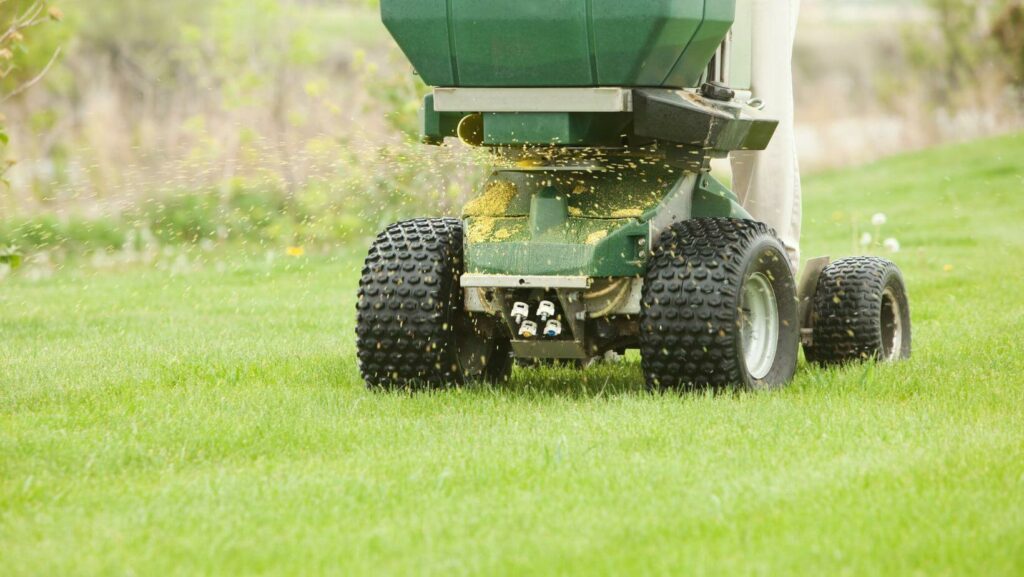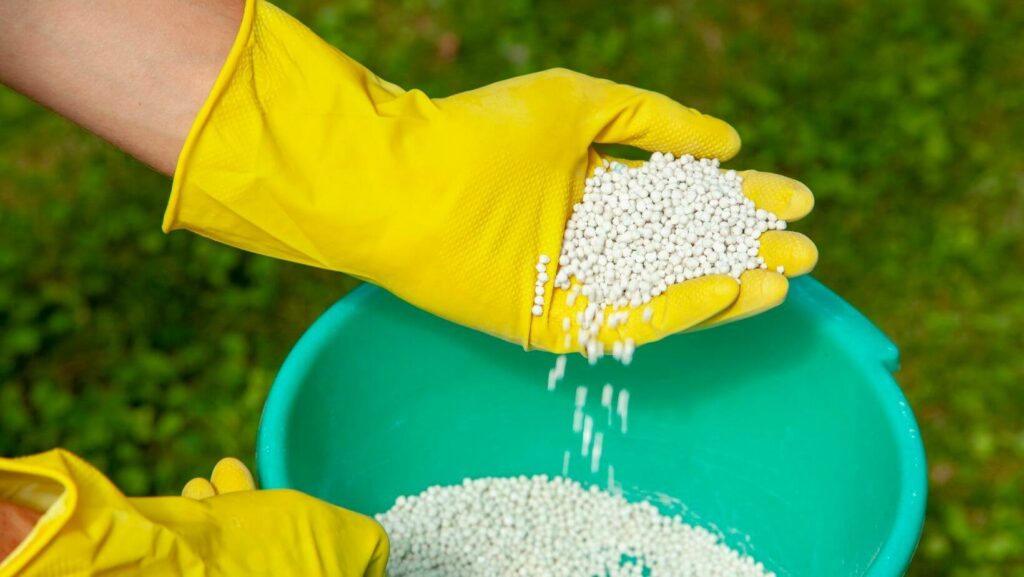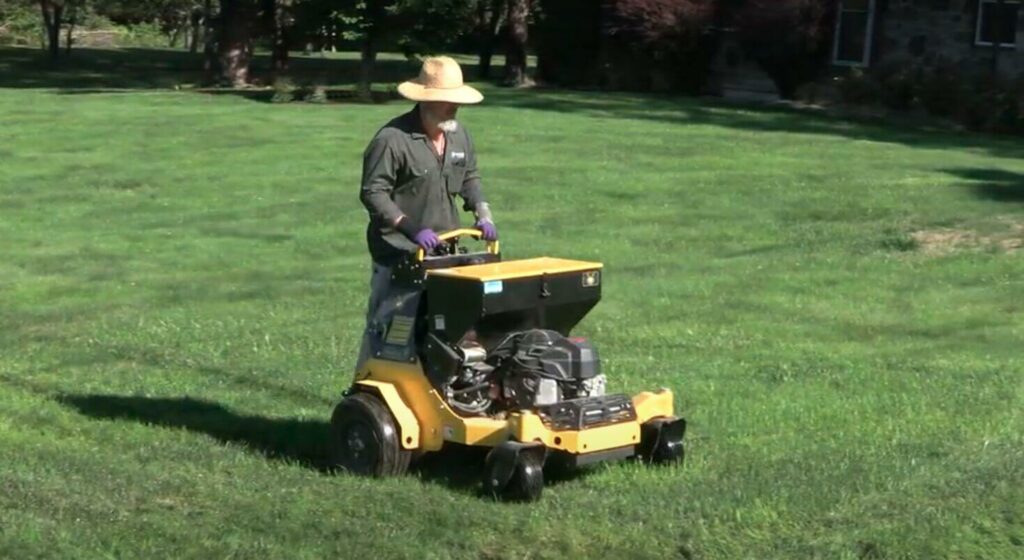Winter in the Northeast can present challenges for homeowners particularly in terms of lawn care. When temperatures drop and snow covers the ground it’s easy to overlook the health of dormant grass. However, proper preparation and maintenance of your lawn during winter are vital to ensure its health and vigor in the coming spring.
Winter fertilizer is one of the most effective tools for winter lawn care. This article will cover everything you need to know about winter fertilizer, including its application, selection, and the benefits of seeking professional assistance to make sure your lawn has exactly what it needs come spring.
What Is Winter Fertilizer?
 Winter fertilizer is a specially formulated product designed to support grass during the colder months. What sets it apart from regular fertilizer is its composition, typically higher in potassium, which fortifies the grass against cold weather and diseases. This type of fertilizer plays a vital role in strengthening the roots and preparing the lawn to withstand the harsh winter conditions.
Winter fertilizer is a specially formulated product designed to support grass during the colder months. What sets it apart from regular fertilizer is its composition, typically higher in potassium, which fortifies the grass against cold weather and diseases. This type of fertilizer plays a vital role in strengthening the roots and preparing the lawn to withstand the harsh winter conditions.
By using winter fertilizer, homeowners in the Northeast can expect to see a noticeable improvement in their lawn’s resilience and overall health, providing a greener, more robust lawn in the spring.
Quick Tips:
-
Specially Formulated: Winter fertilizer is designed specifically for cold weather, with a composition that supports grass health during winter months.
-
High in Potassium: It typically has a higher potassium content compared to regular fertilizers, helping to strengthen grass roots and improve resistance to cold and disease.
-
Prepares for Spring: Applying winter fertilizer is crucial for ensuring that the lawn remains resilient through winter and emerges healthier and greener in the spring.
How To Use Winter Fertilizer
Using winter fertilizer effectively is key to maximizing its benefits. The process begins with timing – the ideal time for application is late fall or early winter, just before the first freeze. Accurate measurement is crucial; applying too much or too little can be detrimental to your lawn’s health.
A spreader can help ensure an even distribution of the fertilizer across the lawn. Safety is also paramount; always wear protective gear and follow the instructions on the fertilizer package. After application, a light watering can help the soil absorb the fertilizer, but be careful not to overwater, especially if freezing temperatures are imminent.
Quick Tips:
-
Timely Application: Apply in late fall or early winter, just before the ground freezes, to maximize effectiveness.
-
Correct Measurement and Distribution: Use a spreader for even application and adhere to recommended amounts to avoid damage to the lawn.
-
Post-Application Care: Lightly water the lawn after applying the fertilizer to aid absorption, while being mindful of not overwatering, especially in freezing conditions.
How To Choose the Best Winter Fertilizer
 Selecting the right winter fertilizer is critical for effective lawn care. The process starts with understanding your lawn’s specific needs, which might require a soil test. The market offers various types of winter fertilizers, including granular and liquid forms, each with its own advantages. Consider the specific needs of your lawn in the Northeast’s unique winter climate, including the type of grass and soil conditions. The choice between organic and chemical fertilizers is also significant, with each having different impacts on the environment and the health of your lawn. It’s often beneficial to seek expert advice or consult a lawn care professional when making this decision.
Selecting the right winter fertilizer is critical for effective lawn care. The process starts with understanding your lawn’s specific needs, which might require a soil test. The market offers various types of winter fertilizers, including granular and liquid forms, each with its own advantages. Consider the specific needs of your lawn in the Northeast’s unique winter climate, including the type of grass and soil conditions. The choice between organic and chemical fertilizers is also significant, with each having different impacts on the environment and the health of your lawn. It’s often beneficial to seek expert advice or consult a lawn care professional when making this decision.
Quick Tips:
-
Understand Lawn Needs: Conduct a soil test to determine your lawn’s specific requirements, considering the type of grass and soil conditions.
-
Type and Formulation: Choose between granular or liquid forms, focusing on a formulation that addresses the unique challenges of the Northeast winter climate.
-
Organic vs. Chemical: Consider the environmental impact and the health of your lawn when deciding between organic and chemical fertilizers, potentially seeking expert advice for the best fit.
Important Tips for Using Winter Fertilizer
When it comes to using winter fertilizer, a few tips can go a long way. Always adhere to the manufacturer’s instructions regarding application frequency and quantity. Keep an eye on the weather; avoid applying fertilizer right before heavy snow or rainfall. Water management is crucial post-fertilization; ensure your lawn receives enough moisture but avoid waterlogging. Regular lawn care throughout the winter months is vital for the best results. Also, be wary of common mistakes, such as applying the fertilizer too late in the season, which can lead to suboptimal outcomes.
Quick Tips:
-
Follow Manufacturer Guidelines: Adhere strictly to the instructions for application frequency and quantity to prevent over or under-fertilizing.
-
Weather Awareness: Apply the fertilizer when there’s no imminent heavy snowfall or rain forecasted to ensure it’s effectively absorbed.
-
Ongoing Care and Mistakes to Avoid: Maintain consistent lawn care through the winter and avoid common errors like late-season application, which can be less effective.
Hiring a Professional to Fertilize for Winter
 For many homeowners, hiring a professional to handle winter fertilization is a convenient and effective option. Professionals bring expertise and knowledge about regional lawn care needs and can tailor their services to your lawn’s specific requirements. This option can be particularly appealing for those who prefer to avoid the labor and complexity of DIY lawn care in cold weather. When hiring a professional, consider their experience, reputation, and cost-effectiveness. Ask about their approach, services offered, and whether they use environmentally friendly products. Choosing the right professional can make a significant difference in your lawn’s health and appearance.
For many homeowners, hiring a professional to handle winter fertilization is a convenient and effective option. Professionals bring expertise and knowledge about regional lawn care needs and can tailor their services to your lawn’s specific requirements. This option can be particularly appealing for those who prefer to avoid the labor and complexity of DIY lawn care in cold weather. When hiring a professional, consider their experience, reputation, and cost-effectiveness. Ask about their approach, services offered, and whether they use environmentally friendly products. Choosing the right professional can make a significant difference in your lawn’s health and appearance.
Quick Tips:
-
Expertise and Tailored Care: Professionals offer specialized knowledge and can customize fertilization strategies to suit your lawn’s specific needs and regional climate.
-
Convenience and Efficiency: Opting for a professional service can save time and ensure accurate application, especially beneficial for those unfamiliar with DIY lawn care.
-
Considerations in Selection: When choosing a professional, evaluate their experience, reputation, and practices to ensure quality service.
Securing a Vibrant Spring Lawn Through Winter Care
Taking care of your lawn during the Northeast winter is essential for ensuring a lush, green yard in the spring. Understanding and correctly using winter fertilizer is a key component of this care. Whether you choose to apply the fertilizer yourself or hire a professional, the effort you put into your lawn during the colder months will be evident when warmer weather returns. Remember, a healthy lawn not only enhances the aesthetic appeal of your home but also contributes to the local ecosystem. For more information on lawn care or to inquire about our professional services, feel free to reach out.